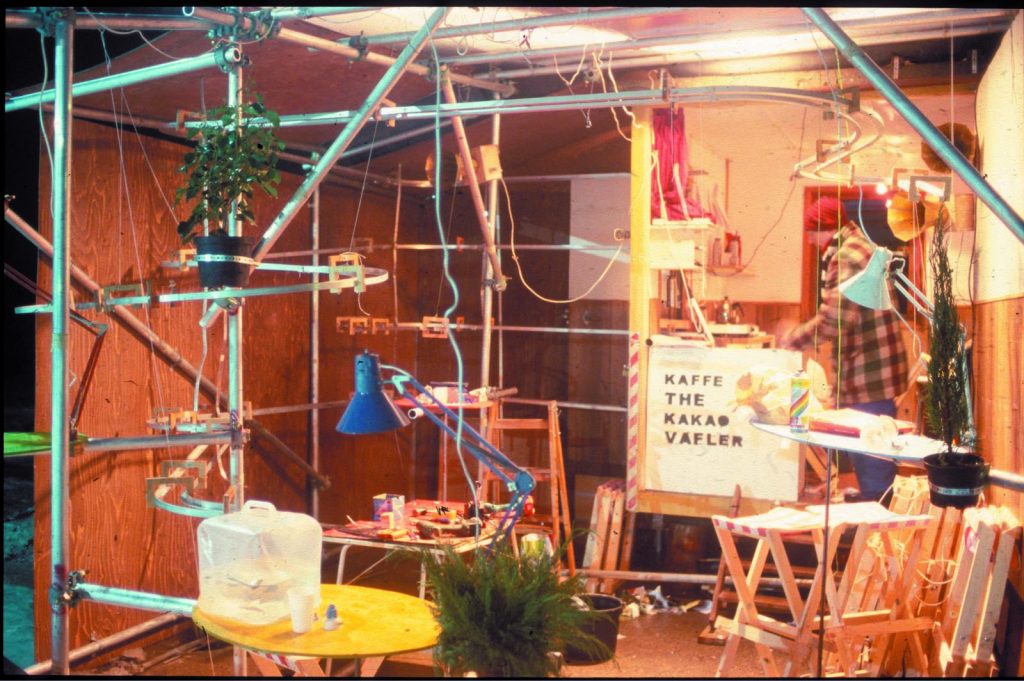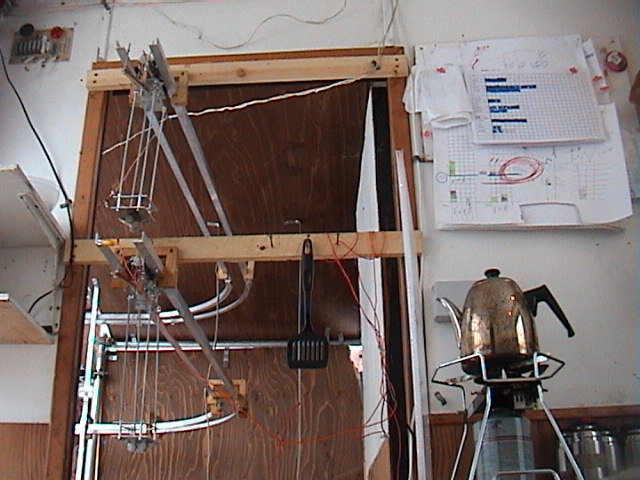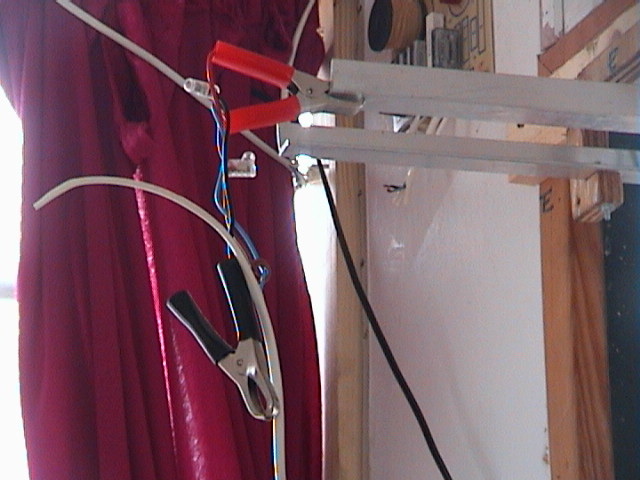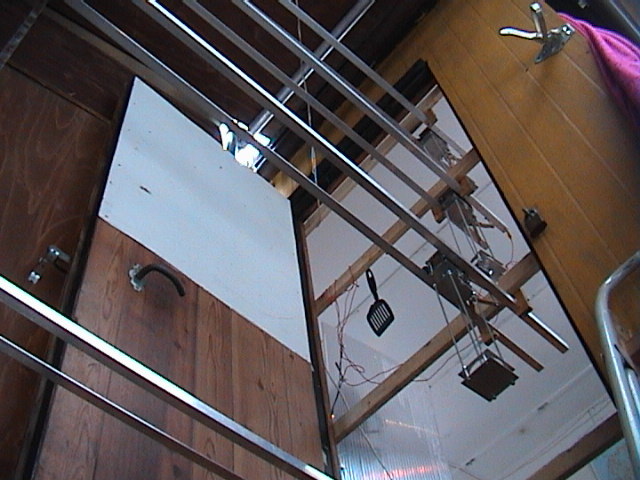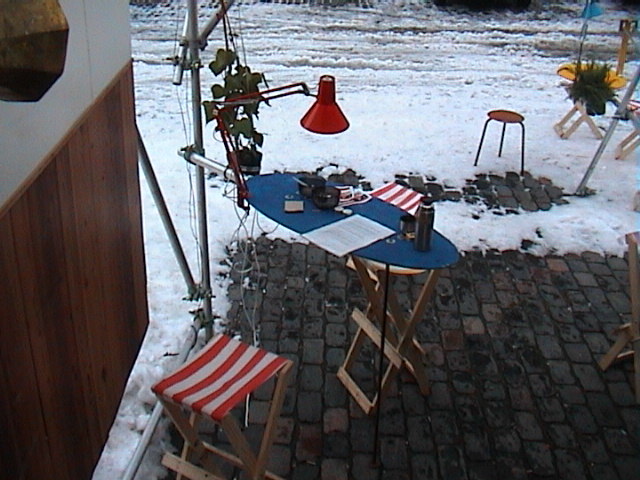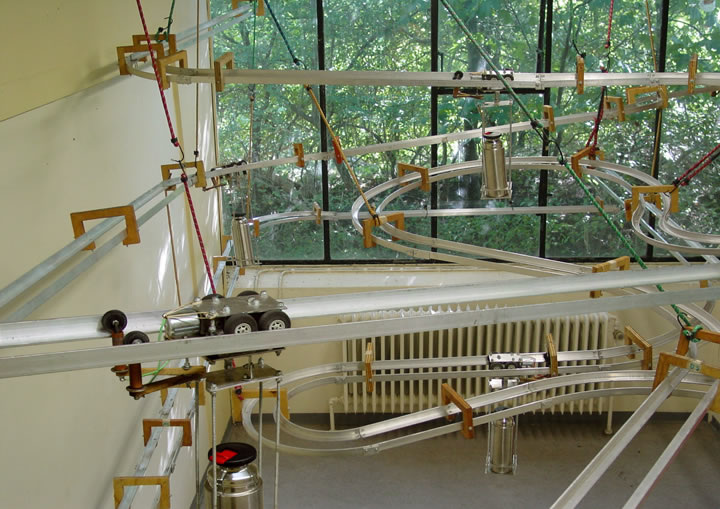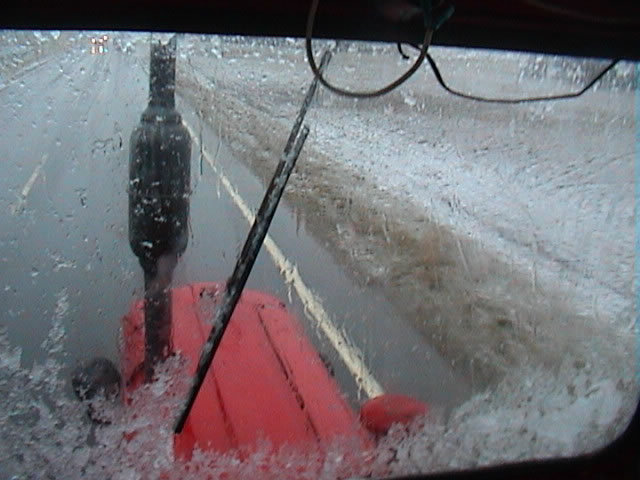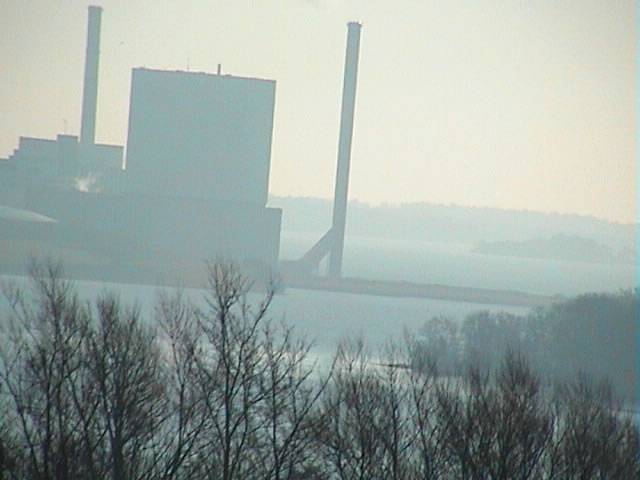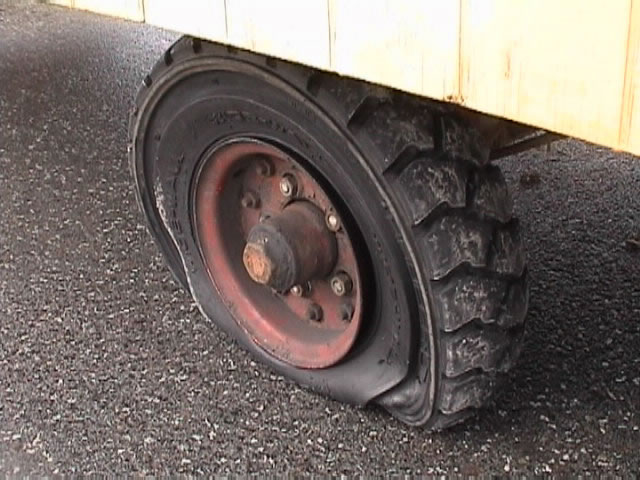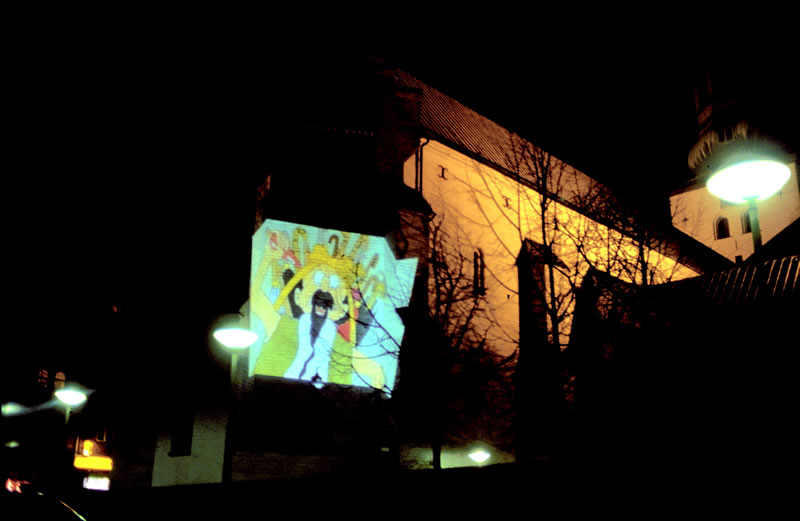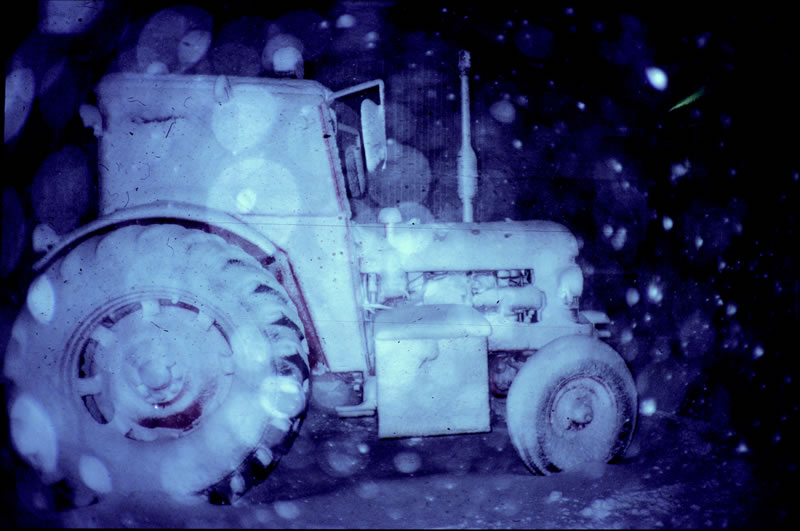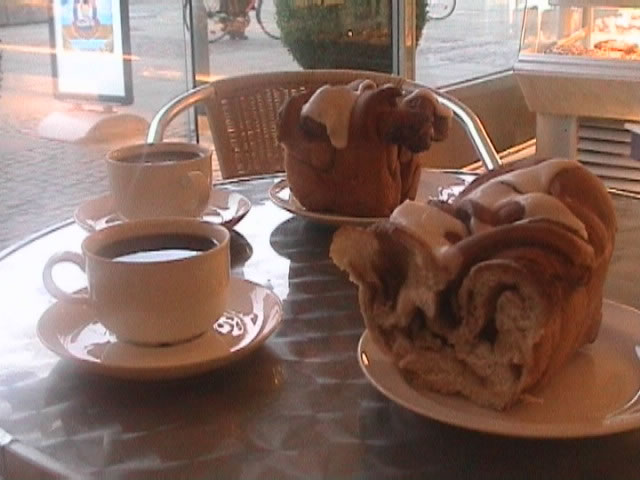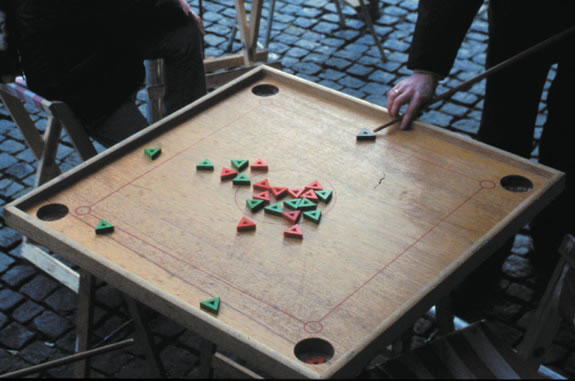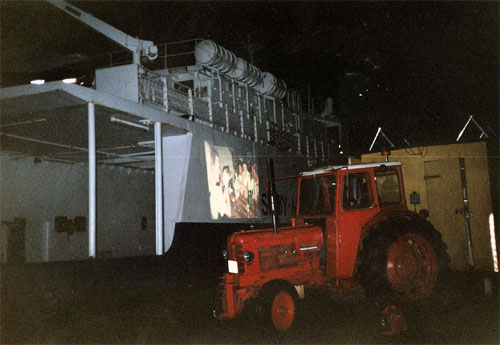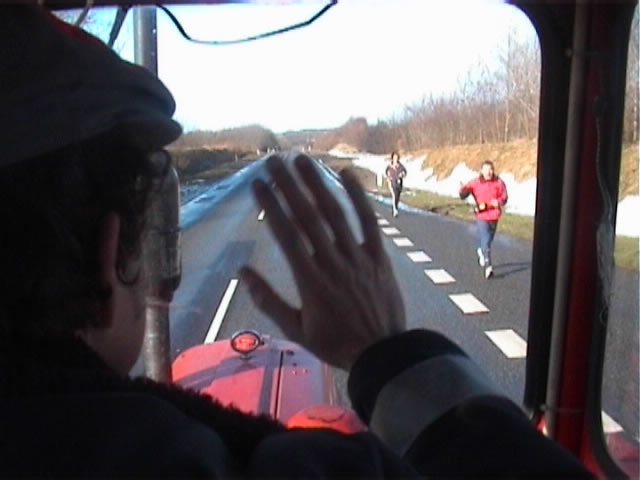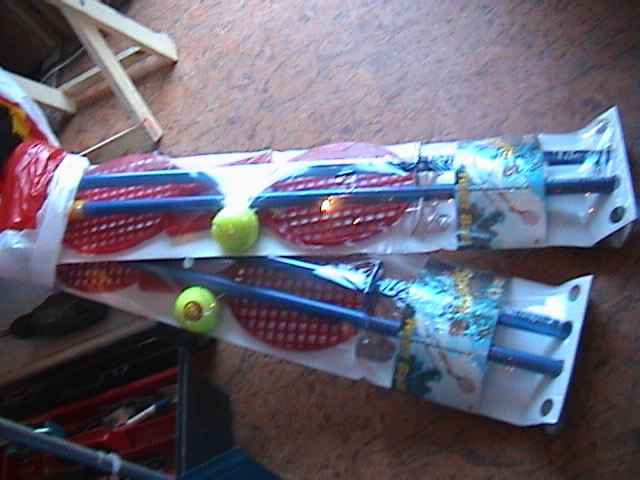Tour De Denmark
Date: 2001-2002
(text from booklet “Tour De Denmark”)
In the middle of September 2001 we bought a tractor, a red Volvo Boxer 350 from 1957. More or less at the same time a landscape gardener gave us a mobile site-hut. In other words: a long journey through winter Denmark could begin.
A journey which officially started in the Zealand town of Roskilde in the weekend just before Christmas and which continued all the way to the town of Aalborg in Northern Jutland, to return to the starting point in the middle of March. During this tour a diary was kept, permissions were obtained from various local government offices, there were parties, music was played, things were built, there were discussions, films were shown, we froze, it snowed, the wind blew and several Cookies were eaten.
To cut a long story short, the thoughts presented above on planning and testing as well as the previous tour came into being out of a basic desire to react, to participate in one’s own way, to have something to say, to make a personal contribution, be present, out of democracy
So here we’re sitting, in the middle of everything, just as everybody sits in the middle of everything: us with our tractor, the site-hut, aluminium tubes, standard plates (painted/unpainted?), projector, drawings, solar cells, coffee serving system, office lamps, gas burners and a minidisc player to use for recordings.
Pelle has grown a beard and Ebbe is trying to; in any event we feel that in completing this tour we’ve passed a kind of manhood test. Our starting point was that we wanted to expose ourselves to a lot of reactions to what we were travelling around with in our site-hut. We spent a couple of days unpacking and building up each time we got to a new place. In all the eight cities we visited we had the same rhythm: Tuesday and Wednesday we set up, the Café was open Tuesday/Friday/Saturday, and then we packed up and moved on Sunday/Monday.
But as mentioned already, the tour started in Roskilde, to be exact on Tuesday, December 18 2001:
It’s half past nine, and the outward construction has been completed (and mended). It’s just been snowing a little bit. The first three guests have arrived. Ebbe is testing the serving system and the Thermos goes over the edge! Did it break? Ebbe tries again and under great acclaim he succeeds, which means that the first guests at the Café have had their coffee, but will they pay? It may seem fair, since they are our first visitors. Two of them seem to be sweethearts.
The coffee serving system was one of the most impressive things which we could present in the Café. For quite a while now there’s been a considerable world-wide consumption of coffee. Coffee is an important drink which everybody can relate to. Being with other people is often accompanied by a cup of coffee. If you don’t drink it you’re probably standing next to somebody who does.
It’s a question of reaching out, of building us up, big and wide, in the middle of a square, like an octopus stretching out its tentacles after people. We got a lot of praise for our coffee – but, then again, we were very decent and uncompromising as far as quality was concerned: only the finest coffee was allowed to hang under the belly of our electronic beetles.
We feel that in many ways life compares to a long cup of coffee: the automatic pouring down of one gulp after another. And this is where we come in…
Coffee Surfers
It’s a cold Café; we’re thinking about getting some kind of an oven, perhaps Ebbe’s aunt has one we can borrow?
It’s December 20, the great tour of Denmark has been launched. According to my frozen toes, all the talk about testing things in the wintertime will soon become a reality. Ahead lies the time for experiments. Experiments with the vast, cold reality and the powers within our own selves.
Pede is our guest. He asks, Where is the loo?
I reply, At the first floor of the Quickly supermarket.
We’ve visited the major provincial towns, with Esbjerg as the sad exception. We contacted the local governments and made a clear appointment about dates quite a while before we got there. We wanted to get into the central pedestrian street systems, so that we didn’t have to rely on advertising and various local culture calendars with each their specific deadlines. Our set-up should be a surprise, something which the lady with her shopping bag would see; we often found ourselves at the market square of the particular town, and once we had to be part of the marketplace-puzzle.
The town of Næstved
A cup of coffee with a waffle was served for the first time on January 10 2002 at 11 p.m. The customer was extremely satisfied with both and prophesied that we would be a great success (profit?). The customer had tarot cards in his inside pocket. The cocoa sale has been beyond our wildest expectations. Non-stop cocoa-making. We’re tired and tired and tired. Thursday is almost over: we still haven’t rehearsed our pop songs; we also need to write and complete a few more… It will be interesting to see if tomorrow afternoon will be as stressful in terms of selling as today was. There’s also a full afternoon of shows. Some even drink two cups of cocoa.
We’ve had more than we bargained for as far as the selling potential of the Café is concerned. It’s surpassed all our expectations, and now it looks like there will be place for experimentation. Right now I can’t think of anything, but it’ll probably come back to us once we’ve regained our strength. It’s hard to be a Café owner, you see!
It’s a long way to Aalborg when everything isn’t functioning, but then we’ll just have to work hard. Tomorrow, Saturday, there’s supposed to be a crowd of people at the skating ring. Once again, we’re co-operating with Quickly, only this time we don’t have to borrow their toilet, because Kurt has seen to it that we have access to a toilet of our own. We’ve been given a key.
The towns and the councils turned out to be surprisingly different. Do taxation, income basis and population structure have something to do with this? Or is it rather a tradition to be kind and have green plants in the staff room? It was a thought-provoking experience to see how different population trends are interpreted in the local administrations. In some places there are confusion and lack of time (bad idea), while in other places you get attached to an employee who follows you through all the appointments you make (good idea). The public system which people talk about, mostly critically, is something you visit or exchange letters with. In some local governments you’re allowed to make prints without a charge, or you can access the Net, either at the continuation school, the library or even at the local government administration itself. To set up you need permissions from the technical administration and the police of the town in question; and then you’re presented with a set of rules and regulations that limits how you can behave and what you can do. When you’re living with these rules and regulations for more than three months they undergo a change and become emotional. We’ve had raised eyebrows and inquiries to make sure that we won’t hurt the selling of sausages, even though we dumped the price of a cup of coffee to only DKK 5 per cup.
In Nykøbing Falster you’re not allowed to drink alcohol at the square, so those who happen to like to have a beer out in the open are standing at a distance of 50 metres and loudly having a good time. We, however, cheat now and again and have a beer to keep warm.
In the discount supermarket Netto, there’s a special offer on Tintin videos, DKK 35 a piece, so they’ll be a permanent feature in our cinema from now on.
Things, however, got off to a pretty complicated start here in Nykøbing: we got into a conflict with the market sellers over the stalls which are reserved for market days Wednesday and Saturday. When we arrived from Næstved on Tuesday we didn’t know anything about this little puzzle, but Wednesday morning we were reminded about it by both BM Fish and Ove’s Cheese. After moving the tractor and the site-hut around a bit we found a fine spot which made everybody happy.
The on-going tour of Denmark is the result of lengthy preparations, discussions and theories about where to put our energy. Waking up at the square of Nykøbing Falster on a rainy day is therefore a part of the experiment and the realisation of art in the Danish provinces in the year 2002, with a red tractor slowly making its way through winter Denmark.
A man asked if we were aware that our solar cells were pointing in a northern direction – we probably weren’t. But Ebbe has in fact been quite good at moving them about. The speed of things here in Nykøbing Falster matches that of our tractor. From what we hear our Volvo should have been used a lot in the region of Lolland-Falster some 30 years ago. Even today many Volvo tractors can be found here.
The sausage stand at the square is busy all the time. Their sausages are probably a far more integral part of this square than our Café.
The customers know what’s on offer. The speciality: drinking chocolate heated on the sausage heater is a local hit. Will we ever be a local hit or perhaps even a global one?
As we made our way across Lolland we had our first accident: one of the tires of our site-hut collapsed. As we continued across Lolland and made it to the island of Langeland it happened three more times; and when we finally got up on a weighing machine we understood why: only two wheels for a wheelbarrow to carry a colossus of three tons. We spent the night at the baker’s of the village of Toreby and drank a good deal of coffee with them.
The tractor as a lumbering vehicle, a man-made growler, has all but disappeared from the real world. It probably mostly exists in drawings, in dreams of a commune on a farm, and then of course we shouldn’t forget the many uncles who own a grey Ferguson. It took months to learn the lingo which you need in order to perform an act as mythological as buying a tractor. We’ve learned that you’ll soon see the latest Ford, Ferguson or John Deere overtake an elderly Opel at the motorway. Riding in our 2.8 tons machine we were often greeted kindly, but we were also given a knowing look that told us about his own equipment: gps , CD player, heater, power steering, armchair.
Now that we’ve had the tractor for almost a year, it’s clear that it took a long period of training for us and the tractor to handle the legendary eight hour tours, at minus 5 degrees centigrade, across the island of Fyn or up through Jutland.
There was an assigned driver; and the story (a homage) about gears, motor, lights and differential blocks will be published in a separate booklet. There also was an assigned passenger at a collapsible seat next to the driver’s seat. The rhythm and sound of the tractor made it hard to talk and impossible to listen to the radio or to music, so at times our journey assumed a spiritual character. The revolution counter was often our only connection to the real world.
During an exotic trip which involved three ferries in the South of Fyn archipelago we visited the Art Folk High School at the island of Ærø.
Triangular pieces for the “Bob”- board game are introduced in the town of Odense. The brand new product from the think-tank of Perfume!
We still haven’t dug into the home-made, or rather: home-brewed, wine which Ole and Dusa from Ærø gave us, perhaps we’re saving it for the gala night, without really knowing whenever that’ll be.
On the other hand we have restocked our supplies of beer, which we need for the musicians who receive no other fee. Yesterday we had an appearance by “The Guests of Honour”, three young lads from the Ollerup continuation school. At nearly the same time there was a demonstration against the shutting down of an out-of-school education programme for young people, so the Café was nearly packed. But let’s just see if this won’t be evened out today, where we have to admit that we’re standing with our backs to the sun which is actually out and recharges our batteries now and again.
There are many ladies who are wearing high-heeled shoes, promenading up and down the pedestrian street with their click-clack. Perhaps it’s always been like this everywhere, but as we sit here watching, the high-heeled shoes seem to be even more visible in Odense than in other towns. Apart from this phenomenon it is also noteworthy how many people can be seen jogging in groups. Formations up to 20 or 30 people at a time pass us at regular intervals.
We had a visit from six Dutchmen this evening. They watched some Tintin, and then they went to the Flakhaven gardens to play some frisbee. Perhaps Dutch people have a different way of moving about and using the city than the Danes; I mean: bringing a frisbee with you to the centre of Odense is a commendable thing to do.
Now the slide show has begun, DJ Cohen has his slot and is at it. A fond thought goes out to Ole and Dusa at Ærø: we’ve opened their wine and realised that tonight is the gala night, a solemn Friday.
It’s important to understand that today Lis brought us some daffodils in bloom. Important because this is what Pelle right now is using to adjust the slides from Hong Kong.
The town of Kolding
After having been seen by the municipal cultural director of Kolding we were transferred from the appointed place to a kind of backyard; now we’ve jointly found a third place. After nearly half a day of not knowing what would happen, we’ve had a meeting with this man who has a yearly income of DKK 700,000, is supposed to promote Kolding’s creative environment and who is constantly talking about two kinds of people: the Lady Bountifuls and the rest of us.
Jutland is on the agenda for the next month or so: is it a dream coming true? More than two years ago the idea occurred that we ought to make something of this large part of Denmark. Now this idea has become a reality, and it feels just right!
To celebrate this I bought a wool jacket today. Partly in order to give events in Kolding the solemn quality they deserve and partly because it’s still pretty cold. Two bottles of beer saw to it that they got opened, and there was nothing we could do about it. We let them do what bottles of beer do when they’re opened and drunk. It was in this connection that the tractor seemed redder than it ever had before.
Our keen belief that our project reached out to all and sundry was also often commented on, but it was important to us not to shut off any possibilities.
The town of Silkeborg
It’s raining and I’m drinking cocoa. The people of Silkeborg run for shelter in the supermarket Føtex, if they haven’t had the good luck to bring an umbrella with them. As for the question: why don’t they seek shelter in the Café, the explanation probably is that the roof which should provide cover is by now so full of holes from being put up in all the previous towns that the rain drips everywhere. Rain breakers have been put up. Holes have been fixed. But the rain nevertheless finds its way in. The wind gives it a helping a hand, mean scoundrel that it is.
A man gave us an instant scratch card, because he liked our Café so much. Ebbe did the scratching while Pelle cheered. We didn’t win anything.
The evenings were set aside for our cinema with films and slides. We projected our films onto a lorry, a church, a gable end and the inner side of our own door. Some six or seven films were produced by us, but we had also been around and borrowed films from others. In all modesty we were thus in a position to entertain both families, young people in high spirits and serious-minded students/bachelors.
Right next to Føtex we’ve built a tiny branch with a slide projector showing pictures of forgotten holidays to Majorca and Iceland. There were four chairs for the audience.
The square you borrow belongs to everybody, and therefore the basic target group should be all the people living in this particular town. Gradually we’ve found out that it isn’t always the direct contact of conversation you should go for. What you should do is to keep in close contact with yourself and then carry out the contributions you’ve decided on. This is what will carry over to the next town and further on. Not everybody has a need to be part of something that involves visible vulnerability or social contact. This applies to the majority of the population.
A small construction can be seen and perceived within the five seconds it takes to pass it, and the mere fact that this construction is placed on a small square in Kolding in February justifies its being constructed. The next question then is if it can add something good to the town in question, because not everything is equally good.
The town of Århus
There’s a snowstorm in the centre of Århus, and the Council has privatised its electricity boxes which would normally have supplied us with power. But since we wouldn’t pay the DKK 2,500 it costs to open one of the boxes we’ve entered into an agreement with Lions Pub, so that we’ve been able to get a cable from them to us. We’re connected.
Through some years now we’ve invited different bands to participate in the projects and exhibitions we’ve made. This has created some fantastic situations and experiences. We’ve experimented a good deal with an active linking, and in Århus this culminated with us having an actual house band for the three days we stayed open. During Le Grand Tour on Saturday night we drove through Århus with our tractor and band, playing music and showing films, but perhaps Århus didn’t really deserve this gesture.
From the point where we started thinking about how to put our procession together, we fully realised that we were enacting an old play from 30 years earlier, from a time when the set-up at least was a bit less icon-like than the case is today. But to us there wasn’t anything demonstrative or sneering about this role. We feel that it’s OK to reuse or even improve on ideas from before we were born, as long as we’re conscious about it.
The town of Aalborg
We reached Aalborg on a Tuesday afternoon. We sneaked in through the backdoor, along the inlet of Limfjorden after having spent a few days exploring an area which calls for dinners with eel and cold snaps.
We’ve met a lot of kindness during our tour, both during the breaks and in the different towns. We have been living in a very exposed manner, and yet we haven’t had any fundamentally horrible experiences, even though we had prepared ourselves for the worst.
In Aalborg we were invited to dinner, and at the Limfjorden we borrowed a small cottage where they had works by Danish painter Poul Gernes on the wall. We took a bath at the Kolding holiday centre, at five Germans’ place, five Germans who made robots.
Today we took the bus out to an open house arrangement at the Aalborg University. It’s located five kilometres outside town, so it was the classic concrete building style. But we wanted to see if there was a particularly experimental spirit up here. Interesting environments have a way of appearing in places which are somehow isolated (and with all due respect, Aalborg…). On Friday evening we’ll give a lecture at the school of architecture. The students will be invited to sample our well-known mix with its unfailing sense of style of films and slides from previous towns and projects, carpets, coffee and beer.
Cinema programme:
Ebbe’s and Pelle’s: The Woodcutter Film, The Moped Road Movie, The Boat Film, The Karate Film, Palm Singing on a Field, The Car in Portugal, Danish Championship in Remote and Cable-Controlled Cars
Additional films were shown by: Spild af Tid/Waste of Time, students from the European Film College in Ebeltoft , Tintin
The route through Denmark, the opening hours of the Café:
Roskilde December 20-22
Næstved January 10-12
Nykøbing Falster January 17-19
The Art Folk High School at Ærø January 21-23
Odense February 7-9
Kolding February 14-16
Århus February 21-23
Silkeborg February 28-March 2
Aalborg March 7-9
Also thanks a lot for your contributions:
Roskilde: Bix, Addicted Adda
Næstved: Atelier Dit Svin/The Studio You Swine, AnneSofie a.o., Carsten Bo Andersen a.o.
Nykøbing Falster: Martine Madsen’s bands
Odense: Æresgæsterne/The Guests of Honour, Thomas’ Trio
Kolding: Je m’apelle Mads by Mads Geertsen
Århus: Støv/Dust by J. Anderskov, J. Skovbakke and R. Kilsgård, Papagallo
Aalborg: The Experimental Art School
A special thanks to Lars Ole for repairs.
Kind regards Parfyme (perfume)
By Pelle Brage and Ebbe Dam Meinild
Booklet on Parfyme (perfume): The Great Tour of Denmark
First impression (50), June 2002
Parfyme was supported by the Danish Ministry of Culture Development Fund, the Danish Visual Art Council and the places where we stopped on our way.


